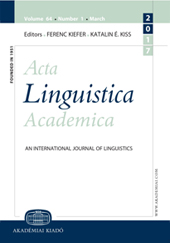Ritual public humiliation
Ritual public humiliation
Using pragmatics to model language aggression
Author(s): Zoltán Dániel Kádár, Puyu NingSubject(s): Language studies, Semiotics / Semiology, Pragmatics
Published by: Akadémiai Kiadó
Keywords: punishment; humiliation; ritual language behaviour; Chinese
Summary/Abstract: This paper investigates cases in which people who are perceived to have violated a major communal and/or social norm are humiliated in public in a ritual way. As a case study we examine online videos drawn from the Chinese videosharing site Youku. Humiliation as a form of punishment has been thoroughly studied in sociology (see e.g., the seminal work of Foucault 1977). This interest is not coincidental, considering that studying humiliation may provide insight into the operation of shame as a punitive phenomenon, as well as the role of publicity and complex participation structures when shame is inflicted on others. Yet, punitive humiliation has been understudied in pragmatics; in particular, little research has been done on cases in which it is not an institutionally/socially ratified person (e.g., a judge) but the members of the public who inflict humilation. The study of this phenomenon contributes to the present Special Issue as it demonstrates that pragmatics provides a powerful tool to model the dynamics of (language) behaviour such as humiliation that might be difficult to capture by using more conventional linguistic approaches. We demonstrate that while ritual public communal humiliation tends to be highly aggressive, it also shows noteworthy recurrent (meta)pragmatic similarities with institutionalised forms of punishment.
- Issue Year: 66/2019
- Issue No: 2
- Page Range: 189-208
- Page Count: 20
- Language: English

